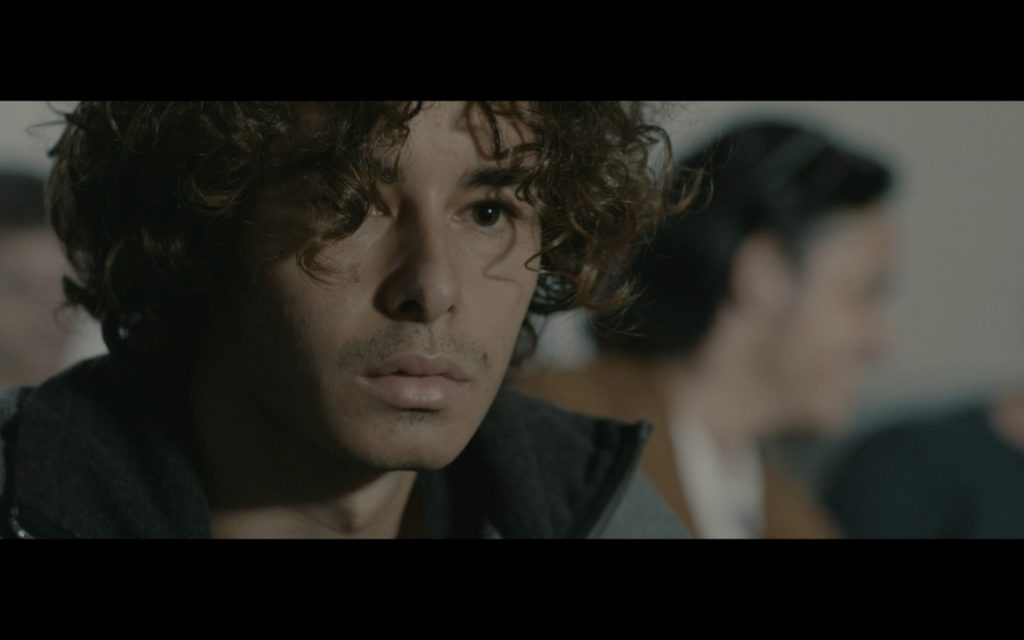马塞洛
Marcello
导演|弗朗西斯科·迪·朱塞佩
编剧|弗朗西斯科·迪·朱塞佩
主演| 洛伦佐·古乔内、蒂亚·布鲁诺、纳纳吉·夏加、福斯托·费兰特、
沃尔特·格列柯
制片人|朱塞佩·吉里奥罗索,詹尼·康尼佐
摄影|丹尼尔·塔伦蒂诺
类型|短片
时长|13分钟
完成时间|2021
对白语言|意大利语
字幕|英文
地区|意大利
制片公司|Eikona Film
故事梗概
马塞洛总是看向安德里亚,一个喜欢涂口红并渴望在生物化学课上引起他注意的年轻女孩。 尽管最初的印象是错误的,安德里亚并不是马塞洛所看向的人,但这背后还有更深层次的东西。 《马塞洛》 讲述的是一段跨越性别表达和个人成长之路的旅程。
导演介绍
弗朗西斯科·迪·朱塞佩 1997 年 2 月 4 日出生于巴勒莫。 2020 年,他在巴勒莫亚历山德罗·斯卡拉蒂音乐学院的钢琴大师杰纳罗·佩斯克的班上获得了一级钢琴学术文凭。除了音乐方面的经历,他在艺术上的造诣也是丰富持久的戏剧经历的结果,这段经历始于 2014 年与伊丽莎·帕里内罗的迪提拉姆剧院公司、巴勒莫的比昂多剧院和陶尔米纳古剧院和莫妮·奥瓦迪亚和马里奥等艺术家合作。 2019 年初,他在瓦伦西亚的华金罗德里戈音乐学院获得了伊拉斯谟奖学金,并在那里度过了将近六个月的时间,学习西班牙语和了解西班牙文化。 2019 年 11 月,他在朱塞佩·吉廖罗索指导的钢琴焦点学校开始了他的第一次电影学习,在那里他学习了电影的法则和基本镜头语言,并在老师的帮助和支持下,重拾了对这门艺术的热情和才能。 2020年4月,他制作短片《隔离检疫——隔离中的自画像》(Quarantine Lapse – a self-portrait on quarantine),参加“A casa con Oberon Media”短片电影节并入选国家级十佳。 2020 年夏天,他担任了吉吉·博鲁索导演的短片《罗莎莉亚和丹尼辛尼》(Rosalia a Danisinni)的助理。 2020 年 10 月,他制作了由 Piano Focale 和 Eikona Film 出品的短片《马塞洛》,并搬到华沙以伊拉斯谟奖学金学生身份在弗里德里克肖邦音乐大学攻读伴奏钢琴师硕士学位。
导演阐述
在尝试谈论性别认同、性别表达和一个人的身份时,找到正确的言语和方式并非易事。所以我决定以我确信的事情开始这段旅程:我自己,我的经历和我的感受。《马塞洛》就是这样诞生的。通过自我反省,我再现了主人公所身处的社会带来的不适感与不安全感。为了讲述这个故事,我使用了大量具有反射性的镜头影像。镜子是可以让我们意识到自己的少数物体之一,但同时也可能是骗人的。镜像并不总是清晰,它们可能模糊、肮脏、带有阴影。直视眼睛时也会发生同样的情况。眼睛可以用来观察、判断、比较他人,但也可以传递爱和情感,让我们改变自己所创造的自我印象和他人对我们的印象。 《马塞洛》展示出有时为了找到自我,我们需要将目光从镜子上移开,将目光转移到真正爱我们的人身上。我想讲述这个故事,因为我认为每个人一生中至少有一次会体会到和马塞洛同样的感受。即使我们认为自己可以自由抉择,我们仍然会受到同事、家人和朋友的影响,如今做自己仍然是一件非常困难的事。



Director|Francesco Di Giuseppe
Screenwriter|Francesco Di Giuseppe
Cast|Lorenzo Guccione, Tea Bruno, Nanaji Shakya, Fausto Ferrante,
Walter Greco
Producer|Giuseppe Gigliorosso, Gianni Cannizzo
Cinematographer|Danielo Tarantino
Genre|Short movie
Length|13min
Year|2021
Dialogue|Italian
Subtitles|English
Region|Italy
Production Company|Eikona Film
Synopsis
Marcello always stares at Andrea, a young girl who loves wearing lipstick and craves for his attention during biochemistry classes. Despite the initial wrong impression, Andrea is not what Marcello is staring at: there is something more behind the surface. ‘Marcello’ is a coming-of-age story of transgender self-expression.
Director Biography
Francesco Di Giuseppe was born on February 4, 1997 in Palermo. In 2020 he obtained the 1st level Academic Diploma in piano at the Alessandro Scarlatti Conservatory of Palermo in the class of maestro Gennaro Pesce. His accomplishments in the field of art, apart from those in music, is also the result of his extensive and long-lasting theatrical experience which began from 2014 with Elisa Parrinello’s Compagnia del Teatro Ditirammu, working with artists such as Moni Ovadia and Mario Incudine with whom he had the opportunity to limestone stages such as those of the Teatro Biondo in Palermo and the Ancient Theater of Taormina. At the beginning of 2019 he won an Erasmus scholarship at the Conservatori Superior de Música Joaquín Rodrigo in Valencia, where he lived almost six months and had the opportunity to learn the Spanish and get to know the culture of that country. In November 2019 he began to study film for the first time with Piano Focale school directed by Giuseppe Gigliorosso, from whom he learned the basic language of cinema, rediscovering, with the help and support of teachers, his passion and the talent for this art. In the April of 2020 he made the short movie “Quarantine Lapse – a self-portrait on quarantine”, participating in A casa con Oberon Media, a short film festival, in which he was selected among the top ten at national level. In the summer of 2020 he was the assistant to the direction of the short movie made by the director Gigi Borruso entitled “Rosalia a Danisinni”. In October 2020 he made the short film “Marcello” produced by Piano Focale and Eikona Film and in the same month he moved to Warsaw to attend his first year of the master’s degree in accompanist pianist at Uniwersytet Muzyczny Fryderyka Chopina as an Erasmus student.
Director’s Statement
Finding the right words and ways to talk about gender identity, gender expression and one’s identity is never easy, so I decided to start this trip with something I was sure about: myself, my experience and feelings. That’s how Marcello was born. Through an introspection process, I recreated the protagonist’s discomforts and insecurities because of the society he lives in. To tell this story, I largely used reflected images. The mirror is one of the few objects who makes us conscious of ourselves, but can also be deceiving at the same time. Images in mirrors are not always clear: they can be obscured, besmirched, shaded. The same happens with watching eyes. They look, judge, compare ourselves with others, but eyes can also impart love and affection, allowing us to get over the image we created of ourself and the one people have about us. Marcello shows that sometimes, in order to find ourselves, we need to look away from mirrors and shift the gaze to the ones that really loves us as who we are. I wanted to tell this story because I think everybody at least once in life has felt what Marcello feels. Even when we think we are free to make our choices, still we are influenced by colleagues, family, friends. I wanted to tell this story because nowadays being ourselves can be really difficult.
